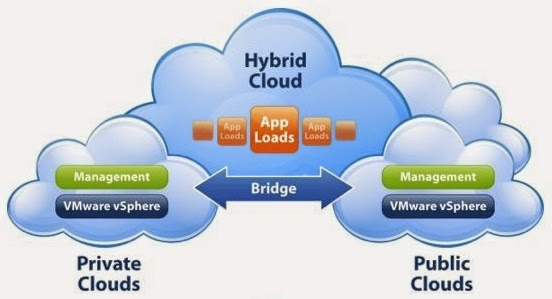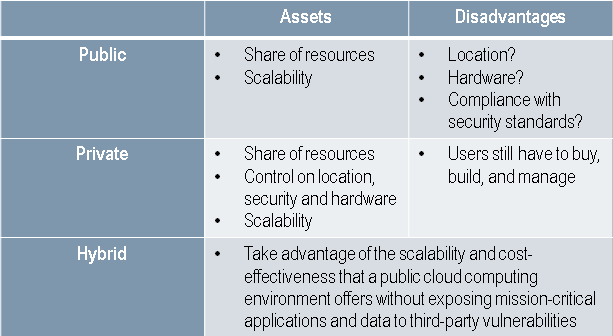Cloud Computing
The Cloud Computing is now a trend and a hot discussion in every IT group. The reason behind is that the cloud infrastructure can offer advantages over traditional data-centers in the areas of performance, scalability, and even security. There is a vast difference between private, public and hybrid clouds for enterprise. The type of cloud service is defined based on the types of data they store. Sometimes these differences narrow, but each type of cloud has different levels of security and varying degrees of management. One may be more flexible or scalable, while another might be more affordable. Here we’ll talk about private, public and hybrid cloud computing and some of their primary differences.

What is a public cloud?
A public cloud provides off-site computing services or set of services that are purchased by a business or a company and infrastructure is been delivered over the Internet. The infrastructure is been hosted, maintained and delivered by third-part providers. It is set up and maintained by a commercial provider to manage relatively simple processes and share resources. The web-based email’s (outlook access anywhere) like Gmail, yahoo and file storages like drop box, one drive, etc. are the best examples for public cloud. In this case the data is been storage in a cloud and you can access them from anywhere, anytime, any device.
What is a private cloud?
Private clouds are essentially an extension of an enterprise’s traditional datacenter and are been designed for the specific needs of an organization, and hosted and maintained on a private network. The companies who use the private cloud deal with more regulation and they take additional security measures to secure the sensitive data internally. The financial and banking sectors mostly go with private cloud.
What is a hybrid Cloud?
Hybrid cloud computing is basically a combination of both public and private cloud computing. It’s now becoming more popular as public cloud users grow more interested in the accessing certain benefits and adaptive capabilities of having a private cloud. It might include multiple providers and usually involves some complexity, as it is a customized solution combining two environments to allow dynamic shifting from one to the other. For some enterprises, it is beneficial and necessary to place different data in different areas. An example of this would be to have specific business developments in a private cloud, and to have more transparent production methods in a public cloud.
Both public and private clouds have management implications. However, by choosing a public cloud solution, an organization can offload much of the management responsibility to its cloud vendor. In a private cloud, there is significant demand on resources to specify, hosting, purchasing, updating, maintaining, and securing the physical datacenter or components. Financially, deploying a private cloud can also create a large initial capital expense, with subsequent investment required as new equipment and capacity is added.
The capital expense is virtually eliminated in the public cloud scenario. The financial burden is shifted to a fee-for-service, often based on utilization and data volume. Maintaining and securing public cloud infrastructure is the responsibility of the vendor, enabling the customer organization to streamline IT operations and minimize time and money spent on system upkeep.
DISCLAIMER: The Article is modified through other resources



You did a great job comparing this three! Thanks for posting this.